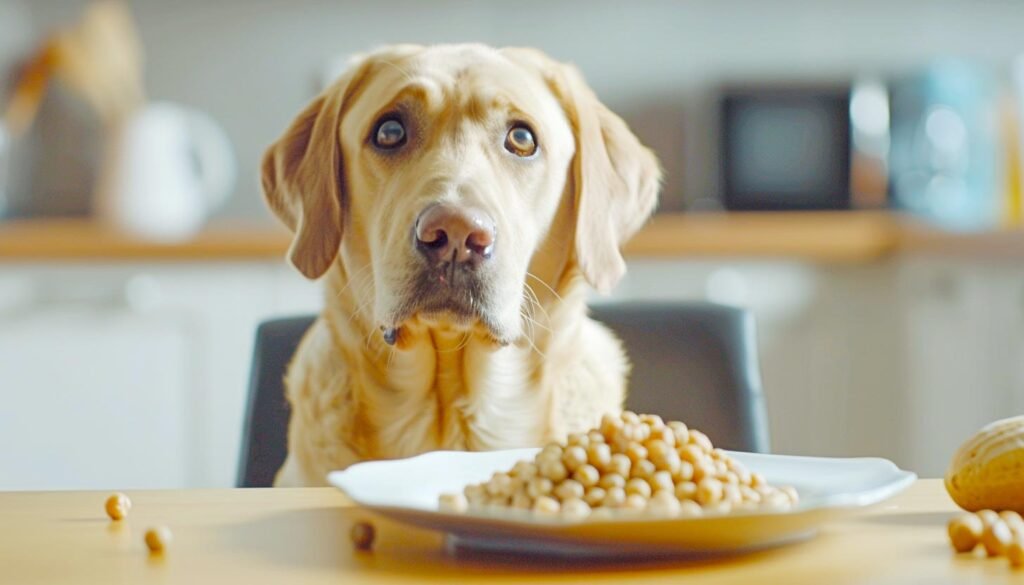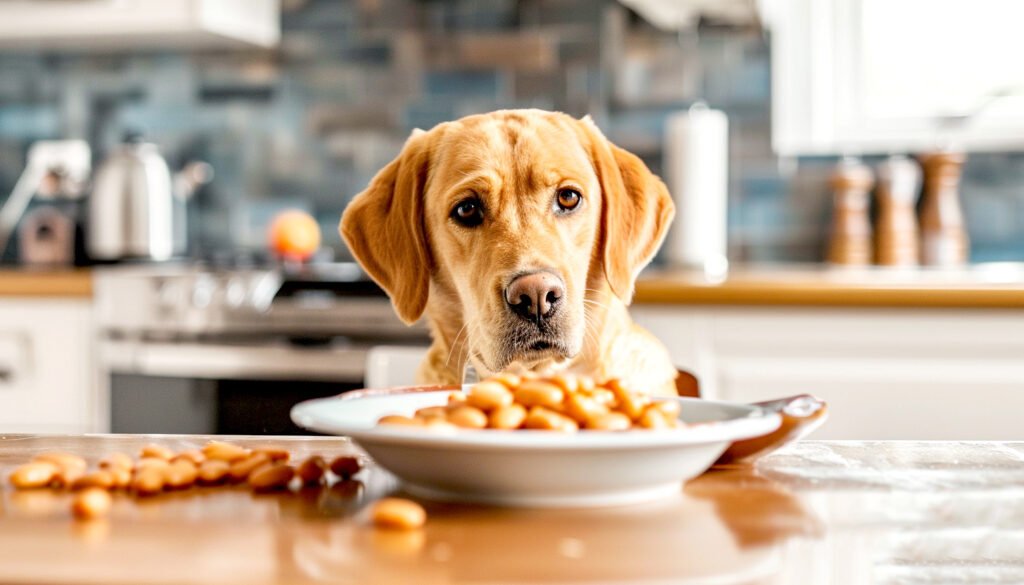Can dogs eat chickpeas? As pet owners, we often find ourselves wondering about the safety and suitability of various foods for our furry friends. Chickpeas, with their rising popularity as a healthy human snack, have found their way into discussions about canine diets. In this article, we’ll explore the nutritional value of chickpeas, whether they’re safe for dogs, potential benefits and risks, and how to incorporate them into your pet’s diet.
Chickpeas, also known as garbanzo beans, are a nutrient-rich legume packed with protein, fiber, vitamins, and minerals. While they offer numerous health benefits for humans, it’s crucial to consider whether these advantages translate to canine health and well-being before making them a staple in your dog’s diet.
Contents
Nutritional Value of Chickpeas
| Amount Per 100 grams | % Daily Value* | |
| Calories | 364 | |
| Total Fat | 6 g | 9% |
| Saturated fat | 0.6 g | 3% |
| Cholesterol | 0 mg | 0% |
| Sodium | 24 mg | 1% |
| Potassium | 875 mg | 25% |
| Total Carbohydrate | 61 g | 20% |
| Protein | 19 g | 38% |
Chickpeas, also known as garbanzo beans, are a type of legume that is high in protein, fiber, and various vitamins and minerals. They’re commonly consumed in dishes such as hummus and falafel and have gained attention for their potential health benefits. According to the USDA FoodData Central, a cup of cooked chickpeas contains approximately:
In addition to these macronutrients, chickpeas also contain important micronutrients such as iron, magnesium, and folate. These nutrients are essential for maintaining a healthy diet and can benefit both humans and dogs alike.

Can Dogs Eat Chickpeas?
The short answer is yes, dogs can eat chickpeas. They are generally safe for our four-legged friends when given in moderation and prepared correctly. However, the key is moderation and preparation, as unprepared chickpeas can pose potential dangers. Raw or undercooked chickpeas can lead to digestive issues such as bloating, gas, and discomfort for dogs. Additionally, the outer shells of chickpeas can be difficult for dogs to digest and may cause intestinal blockages.
Therefore, it’s essential to always cook chickpeas thoroughly before feeding them to your dog. If you’re unsure how your dog will react to chickpeas, it’s best to start with small servings and monitor their response. If your dog experiences any adverse reactions, such as vomiting or diarrhea, discontinue feeding them chickpeas immediately.
Potential Benefits of Chickpeas for Dogs
When given in moderation and prepared correctly, chickpeas can offer several potential health benefits for dogs. These include:
- High protein and fiber content: Chickpeas are a great source of plant-based protein and can provide an alternative to meat for dogs with dietary restrictions or allergies. The high fiber content in chickpeas can also aid digestion and promote bowel health.
- Low glycemic index: Chickpeas have a low glycemic index, meaning they won’t cause spikes in blood sugar levels. This makes them a suitable option for diabetic dogs or those with blood sugar regulation issues.
- Nutrient-rich: As mentioned earlier, chickpeas contain essential vitamins and minerals that can contribute to your dog’s overall health and well-being. These include iron, magnesium, folate, and more.
However, it’s crucial to note that while these potential benefits may sound appealing, they should not replace a balanced and complete diet formulated specifically for dogs. Chickpeas can serve as occasional treats or additions to your dog’s regular meals, but they should not be the main source of nutrition.
Risks of Feeding Chickpeas to Dogs
As with any new food introduced into your dog’s diet, there are potential risks to consider. Along with the potential digestive issues mentioned earlier, there are a few other risks to keep in mind when feeding chickpeas to dogs:
- Allergic reactions: While rare, some dogs may have allergies or sensitivities to chickpeas. If your dog has any known allergies, it’s best to consult with a veterinarian before introducing new foods into their diet.
- High-calorie content: While the protein and fiber in chickpeas can be beneficial, they also come with a high calorie count. If your dog is prone to weight gain or has a sedentary lifestyle, it’s essential to monitor their caloric intake and adjust accordingly.
- Seasonings and additives: Plain-cooked chickpeas are safe for dogs, but any seasonings or additives can be harmful. Garlic and onion powder, for example, can be toxic to dogs, so it’s crucial to always use plain chickpeas when feeding them to your pet.

How to Incorporate Chickpeas Into Your Dog’s Diet
If you decide to introduce chickpeas into your dog’s diet, there are a few things to keep in mind:
- Always cook chickpeas thoroughly and avoid any seasonings or additives.
- Start with small amounts and monitor your dog’s response. If they experience any digestive issues, discontinue feeding them chickpeas.
- Use chickpeas as occasional treats or additions to their regular meals, but not as a replacement for a balanced and complete diet formulated specifically for dogs.
- Be mindful of your dog’s caloric intake and adjust accordingly if needed.
- Consider incorporating chickpeas into homemade dog treats or using them as a topper for their regular meals.
Conclusion: Can Dogs Eat Chickpeas
In conclusion, while chickpeas can offer several potential health benefits for dogs, it’s essential to consider the risks and incorporate them into your pet’s diet in moderation. As always, consult with a veterinarian before making significant changes to your dog’s diet, and be mindful of any potential allergies or sensitivities they may have. With proper preparation and moderation, chickpeas can be a healthy addition to your dog’s diet. So, it is better to seek advice from a veterinarian before incorporating them into your pet’s diet.
Remember, the health and well-being of our furry companions should always be a top priority, and proper nutrition is a crucial aspect of their overall health. When in doubt, it’s always best to consult with a professional before making any significant changes to your pet’s diet. By following these guidelines and being mindful of your dog’s individual needs, you can safely incorporate chickpeas into their diet and potentially reap the benefits they offer. So, keep your furry friend happy and healthy by giving them a balanced and nutritious diet that includes the occasional treat of chickpeas.
FAQs:
Q: Can chickpeas cause allergies in dogs?
A: Yes, some dogs may be allergic to chickpeas or other legumes. Watch for signs of allergic reactions, such as itching, swelling, or difficulty breathing, and consult with your veterinarian if you suspect your dog is allergic to chickpeas.
Q: How should chickpeas be stored for dogs?
A: Store cooked chickpeas in an airtight container in the refrigerator for up to three to four days. If you have leftover chickpeas, you can freeze them for future use. Avoid feeding your dog canned chickpeas that contain added salt or preservatives.
Q: Can I give my dog chickpeas as a substitute for meat?
A: While chickpeas are a good source of plant-based protein, they should not be used as a complete substitute for meat in your dog’s diet. Dogs require animal-based proteins for optimal health, so it’s essential to include a variety of protein sources in their meals.
Q: Are there any other legumes that dogs can eat?
A: Yes, there are other legumes that dogs can eat, such as lentils, peas, and beans. Like chickpeas, these legumes should be cooked thoroughly and fed to dogs in moderation to avoid digestive issues.
Q: How can I tell if my dog is having trouble digesting chickpeas?
A: Watch for signs of digestive upset in your dog after feeding them chickpeas, such as gas, bloating, diarrhea, or vomiting. If you notice any of these symptoms, stop feeding chickpeas to your dog and consult with your veterinarian for guidance on their diet and nutrition.
For more information on dog nutrition and health, check out our other articles:



